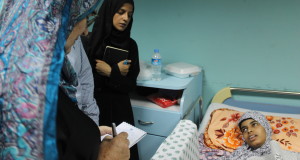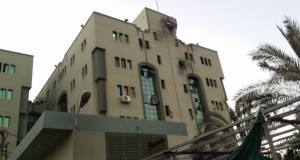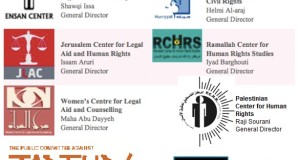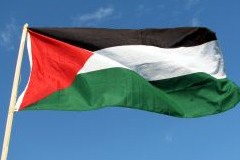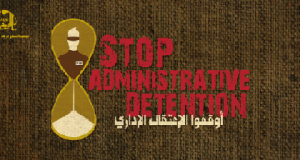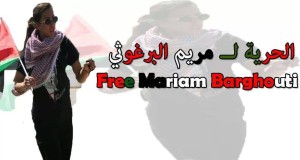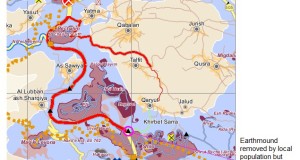16th July 2014 | International Solidarity Movement | Gaza, Occupied Palestine Yesterday evening (July 15th) at approximately 23:05 el-Wafa Rehabilitation hospital in Gaza, near Gaza City, received a call from someone claiming to be from the “Defense department of the ...
Read More »International activists remain in Gaza hospital threatened by Israeli missiles
11th July 2014 | International Solidarity Movement| Gaza, Occupied Palestine Israel’s army fired four ‘warning’ missiles at the roof of El-Wafa rehabilitation hospital in Gaza City, Gaza. International volunteers now staying in the hospital in solidarity, have said they, “can hear ...
Read More »Human rights organizations request immediate intervention from EU Foreign Policy Chief Catherine Ashton
1st June 2014 | Addameer Prisoner Support and Human Rights Association | Ramallah, Occupied Palestine Baroness Catherine Ashton High Representative of the European Union for Foreign Affairs and Security Policy Vice-President of the European Commission 242, rue de la Loi B-1049 ...
Read More »Joint statement: solidarity groups call on Israel to stop administrative detention
25th May 2014 | International Women’s Peace Service, Christian Peacemakers Team, International Solidarity Movement, | Occupied Palestine In support of Palestinian ‘administrative detainees’ on open-end hunger strike Over one hundred and twenty five Palestinian prisoners (ninety of whom are administrative ...
Read More »Update on Hunger Strikes: Administrative Detainees put in Solitary Confinement, Denied Salt Supplements
7th May 2014 | Addameer Prisoner Support and Human Rights Association | Ramallah, Occupied Palestine The latest wave of mass hunger strikes continue for the 14th day as Palestinian prisoners demand the end of the policy of administrative detention. Administrative detention is ...
Read More »Mass Hunger-Strike Launched by Palestinian ‘Administrative Detainees’
24th April 2014 | Addameer Prisoner Support and Human Rights Association | Ramallah, Occupied Palestine Addameer Prisoner Support and Human Rights Association can confirm the launch of a mass open-ended hunger strike involving over 100 Palestinian political detainees. All those involved are ...
Read More »UPDATED: 20-year-old Mariam Barghouti has now been released
15th April 2014 | International Solidarity Movement | Occupied Palestine Update Friday 18th April: Mariam was released yesterday evening and is now home with her family. ***** Update Thursday 17th April: Mariam had a military court hearing this morning and the ...
Read More »Village of Qaryut without reliable access to vital road
15th April 2014 | International Solidarity Movement, Nablus Team| Qaryut, Occupied Palestine The village of Qaryut, located almost halfway between Nablus and Ramallah, has been waiting for the last year to have a reliable and secure connection to Road 60. ...
Read More »BDS: Bill Gates slammed over links to Israel prison torture
Addameer and Palestinian BDS National Committee Palestinian human rights organisations have criticised Bill Gates after it emerged that his charitable foundation is heavily invested in G4S, a private security company that helps Israel run prisons at which Palestinian political prisoners ...
Read More »Seven prisoners continue their hunger strikes despite increasing punitive measures
19th February 2014 | Addameer Prisoner Support and Human Rights Association | Ramallah, Occupied Palestine Seven Palestinian prisoners continue their individual hunger strikes as prison conditions worsen. This is the highest number of strikes since September 2013. Earlier this week, Addameer lawyer ...
Read More » International Solidarity Movement Nonviolence. Justice. Freedom.
International Solidarity Movement Nonviolence. Justice. Freedom.
